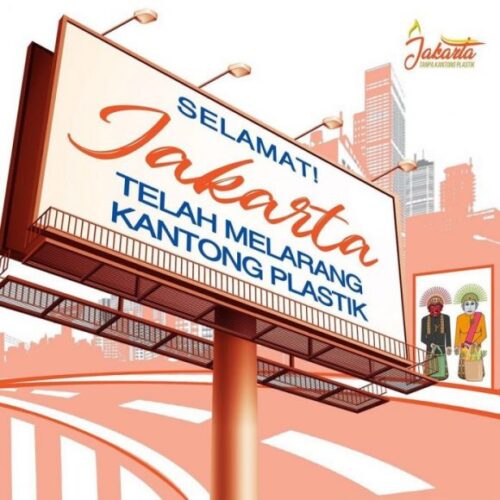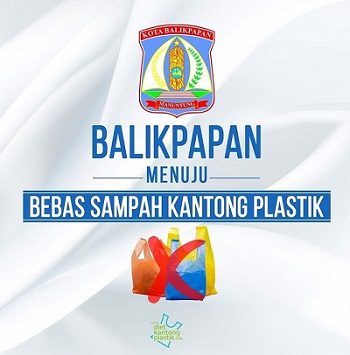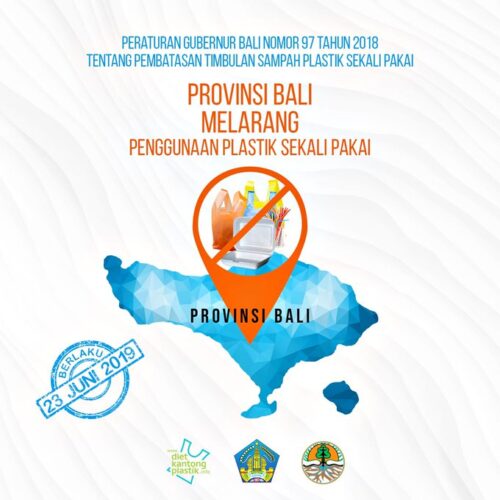Jakarta’s Regulation on Environmentally-Friendly Shopping Bag: What We Need to Know and Prepare
Good news came from the capital city of Jakarta at the end of 2019, because Jakarta’s Governor Anies Baswedan has officially implemented the ban on single-use plastic bags by signing the Governor Regulation No.142 of 2019.

Governor Regulation No. 142 of 2019 regarding The Obligation to Use Environmentally Friendly Shopping Bags
The government of DKI Jakarta has decided to issue a regulation to ban single-use plastic bags because many people contributed to the increasing amount of plastic waste even though they used it for such a short period of time (once, 2-3 times at best).
Moreover, around 14% of the total waste in DKI is single-use plastic.
The Government Regulation was signed on 27th December 2019 and will come into effect on the 1st July 2020. There is a 6-month transition period before the new regulation is implemented that will be used to give socializations to all business owners.
Moreover, the subjects and objects that are governed in the regulation are as follow:
Legal Subject
a. Supermarkets as well as Merchants or Shop Owners inside Shopping Centers and Traditional Market.
Supermarkets as well as merchants and/or shop owners are prohibited to provide plastic bags and are obligated to provide reusable shopping bags.
They also need to communicate to consumers regarding the use of environmentally friendly shopping bags as well as the negative effects of single-use plastic bags.
Furthermore, supermarkets/merchants/shop owners can provide single-use plastic wrap to encase food ingredients that have not been covered by any kind of wrappers.
Should a more environmentally friendly wrapper/packaging is available, then the use of single-use wrapper should be stopped.



Infographic about the legal subjects in the Government Regulation No. 142 of 2019 regarding The Obligation to Use Environmentally Friendly Shopping Bags. Source: lingkunganhidup.jakarta.go.id
b. Manager of Shopping Centers and Traditional Market
The manager or administrator of shopping centers and traditional markets should require all of the tenants and business owners who operate within the shopping centers and traditional market to use environmentally friendly bags as well as prohibit the use of single-use plastic bags.
They should also give information, supervise, and give warnings for all of the merchants within the shopping center and markets regarding the ban on single-use plastic bags and the use of environmentally friendly shopping bags.
Incentives and Sanctions
Manager and/or administrators of shopping centers, supermarkets, and traditional market who have performed their obligation and give socializations regarding the use of environmentally friendly shopping bags will receive regional fiscal incentives in the form of reduction and/or development tax relief for the business.
Conversely, manager and/or administrators of shopping centers, supermarkets, and traditional markets who do not perform their obligation in accordance to Article 5 of the Government Regulation No. 142 of 2019 will be subject to administrative sanctions, namely written warning, fine (A minimum 5 million rupiah and a maximum of 25 million rupiah), license suspension, and license revocation.
Objects of Law
a. Environmentally Friendly Shopping Bag – Required
The definition of Environmentally Friendly Shopping Bag includes reusable shopping bags made from any ingredients, either dry leaves, paper, textile, polyester, and its derivatives, or even recycled materials.
Another important aspect is that the shopping bags should have adequate thickness, designed to be used multiple times, as well as recyclable.



b. Single-Use Platic Bags – Prohibited
The definition of Single-Use Plastic Bags includes shopping bags with handles that are used to transport and or carry stuff.
This plastic shopping bag is made of plastic as the primary ingredients, as well as polymer thermoplastic, latex, polyethylene, thermoplastic synthetic polymeric, or other similar ingredients.
c. Single-Use Plastic Wrap – Allowed
The definition of single-use plastic wrap includes transparent bags that are used to wrap food ingredients that are not yet covered by any packaging for the sake of sanitary purposes.
Such bags are made of plastics, polymer thermoplastic, latex, polyethylene, thermoplastic synthetic polymeric, or other similar ingredients.
The use of such plastic wrapping is allowed until a more environmentally friendly alternative is found. In addition, consumers are also advised to bring their own containers when shopping for wet food ingredients.
What Needs to be Prepared in Response to the Ban on Single-Use Plastic Bags
Knowing Our Rights as a Citizen
As consumers who will be indirectly affected by the regulation to ban single-use plastic bags, the first and foremost thing that we need to know is regarding our rights as a citizen (article 15), which are:
- Have the right to receive environmentally friendly shopping bags with ease from managers and/or administrator of shopping centers
- Have the right to bring one’s own environmentally shopping bag and to refuse the single-use plastic bags that might be given by business owners
- Have the right to receive information on the types and materials of the environmentally friendly shopping bag, as well as the price one needs to pay in order to acquire it.
Use the Existing Ones Instead of Buying New Ones
When this regulation has come into effect in the mid of 2020, the use (and also the purchase) of environmentally friendly bags will certainly increase. The trend to bring one’s own reusable shopping bag is, of course, a good thing because it will reduce the abundant amount of plastic waste.
What is dangerous (and thus need to have our attention), is the behavior or perpetually buying new environmentally friendly bags. What needs to be avoided is forgetting our reusable shopping bag at home and ended up buying a new tote bag, which we might eventually forget to bring again when shopping. This will obviously create new problems.



In fact, the making of reusable shopping bags emits more greenhouse gas and uses more resources compared to single-use plastic bags. Then, what should we do? Using our reusable shopping bags over and over again. A simple answer and solution indeed, but might prove difficult to be implemented in our daily lives.
Why use it repeatedly? Because only by using it repeatedly and perpetually, we can then trade off all the environmental costs that are attributed in the making of those bags.
Only then that we can compensate for the much more resources and greenhouse gasses that reusable shopping bags caused compared to single-use plastic bags.
How Many Times, Exactly?
The means of knowing how many times we should use our reusable shopping bags is by conducting a life cycle assessment of the said products.
This life cycle assessment will then include many factors and variables, such as the use of raw materials, the manufacture and distribution process, as well as the disposal.
By taking into consideration those different variables, researchers will be able to calculate the environmental costs derived from the process, including the number of greenhouse gasses, water and energy consumption, waste production, and many more.
A research done by Denmarks’ Environmental Agency in 2018, for instance, concluded that polypropylene bags need to be used 37 times in order to balance the environmental costs that arise from its production process.
Besides polypropylene, even paper bags need to be used more frequently, 43 times to be exact. As for cotton bags, they need to be used around 7,100 times.



Similar research is also done in the United Kingdom, the difference is that this research only takes into account the climate change effects.
The result is that polypropylene bags need to be used 4 or 11 times (depending on the type of bags), whereas paper bags need to be used three times, and cotton bags to be used 131 times.
Forming the Habit of Bringing Our Own Reusable Bag
From the two research above, it can be seen that reusable bags are indeed needed to be used repeatedly, especially the ones made from cotton. If we only use such bags one or two times, then the environmental costs will instead be bigger than single-use plastic bags.
Therefore, let’s start forming the habit of bringing the environmentally friendly shopping bags that we already have every time we want to shop for something.
Gather and round up all kinds of reusable bags that you have at home, be it from seminars, workshops, or any other events, and start using them.



Check out some of the tips that might come in handy for starting a habit of bringing your own reusable bags:
- Provide environmentally friendly shopping bags in the bags that you use for different occasions, for example your gym bag, work bag, and even travel bag.
- Provide environmentally friendly shopping bags inside your car/motorcycle/in the living room/ near the front door, or any other place that is easily seen every time your family members want to go outside.
- Provide at least two environmentally shopping bags wherever you go. You never know if you need to buy something, or if you just remember that you ran out of food inside your refrigerator. Better safe than sorry.
- Fold and put your environmentally friendly shopping bags neatly. This is important to save some space and to help you decide which bags you will bring.
- Use different environmentally friendly bags for different purposes. For example, use cotton bags especially for food ingredients, whereas the paper bags for clothes and stationery/books. The bags’ material can also be taken into consideration when deciding which bags for which purpose. This is also important to prevent any contamination of bacteria from landing on your food ingredients (if the same bags were used before to carry shoes or clothes for example).



Not The First City to Implement a Ban on Single-Use Plastic Bag
DKI Jakarta is not the first city that officially bans single-use plastic bag. There are around 4 other cities in Indonesia who have implemented similar regulations way ahead of Jakarta, those cities are:
1. Banjarmasin
According to the Head of Banjarmasin’s Environmental Agency, Mukhyar, the ban on plastic bags has been in effect since 2016 in around 130 modern shopping centers.
The policy that was embodied in the Mayor’s Regulation No. 18 of 2016 is deemed as successful as it managed to reduce plastic waste by 55% and save plastic production budget as much as Rp 563 million rupiahs.
To add more, the production of waste in the capital province of South Kalimantan amounts to around 600 tons a day, and 84 tons of them is plastic waste.
This is what makes the regulation to ban plastic bag is highly appreciated, not just by the central government, but also from the international audience.
2. Balikpapan
The government of Balikpapan, East Kalimantan started the ban on plastic bags on July 3rd, 2018 based on the Mayor’s Regulation No. 8 of 2018 regarding Reducing the Use of Plastic Bags.



Since the ban has been enforced, there are around 70-80 modern retailerinstead s in Balikpapan that participated in discarding single-use plastic bags.
As for the traditional market, the ban do not yet come into effect and it serves as a period for further socialization. By July 2019, a report said that the plastic waste in Balikpapan was reduced by 56 tons per month.
3. Bogor
In Bogor, this regulation was implemented on the 1st of December 2018, and it has been going on for more than a year. The regulation is written in the Mayor’s Regulation No. 61 of 2018 onReducing the Use of Plastic Bags.



The reason why the Mayor of Bogor issued such regulation is because plastic becomes one of the biggest contributor of waste in Bogor city. Out of 450-500 tons of waste per day, 13% of them is plastic-based materials.
The figures have not included the waste that are disposed ilegally and not collected by the cleaning staffs .
All in all, the regulation to ban single-use plastic bags in 23 modern retailers managed to reduce 1,7 ton of plastic waste that was generated every day. In total, the policy has helped to reduce around 41 tons of plastic waste.
4. Denpasar
Through Mayor’s Regulation No.97 of 2018 on Limiting Single-Use Plastic Waste, the government of Denpasaran and Bali have officially implemened the ban on single-use plastics in supermarket and retailers.



This regulation came into effet since January 2019, and the types of Single-Use Plastic that are included in the regulations are plastic bags, styrofoam, as well as plastic straw.
Being Responsible in Using Environmentally Friendly Bag
The use of environmentally friendly shopping bag is align with the concept of Reduce and Reuse within the 3R Principles (Reduce-Reuse-Recycle). However, the use and production of such bags need to be carefully taken into consideration.
The least thing that we want from this plastic bag ban is the increased production of bags made from any other materials but plastic, which are more durable but also more difficult to be recycled. One example is the tote bag made from cotton or its derivatives.
One of the solution for shopping bag producers is to reuse the textile materials or mixed materials that can no longer be used using upcycle process into a new shopping bag.
As for consumers, they can help by limiting the purchase of new shopping bags and use what they already have optimally. This is also done to prevent more residual waste from ending up in landfills.
As for single-use plastic bags that can no longer be reused or utilized, make sure that they are recycled responsibly. Waste4Change provides inorganic waste management to make sure that the inorganic materials are reycled throgoughly and optimally through the services called Dropbox and Send Your Waste.
Let’s support the use of Environmentally Friendly Shopping Bag for a better and more responsible waste management as well as to safeguard our nature and environment.
Read the article in Indonesian version in here.



